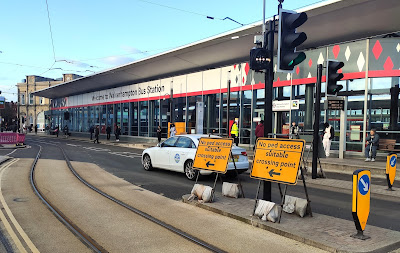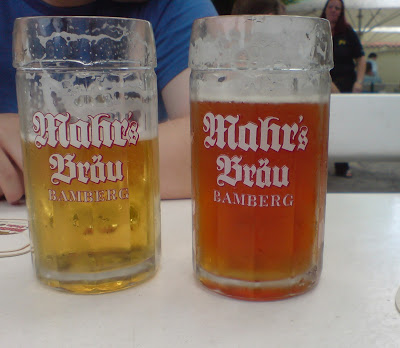That was a one off, so let's wipe the slate clean and regard my recent trip as the first proper visit I’ve made to the Black Country. The area gained its name in the mid nineteenth century due to the smoke from the many thousands of iron-working foundries, forges and thick seams of coal which were easy to excavate due to their shallow nature. Because of the physical nature of coal mining and iron smelting, workers in the region would have developed king-sized thirsts, so one legacy of this is the large number of breweries and pubs that grew up as a result of this industrial activity.
It had long been an aim of mine to visit and enjoy some of the area’s rich heritage of unspoilt pubs, and after exploring this idea with local Pub Man, Stafford Paul on the Beer & Pub Forum, hosted by Tapatalk, the logistics behind such a trip were gradually sketched out. We narrowed the number of pubs down to half a dozen, and worked out an itinerary that would enable us to visit each one, whilst allowing sufficient time to fully appreciate each individual hostelry. We called this plan as a Black Country Walkabout, and originally scheduled the visit for August last year. That was when COVID decided to raise its ugly head again, because just four days before our scheduled tour, I went down with what turned out to be my third bout of the plague. The trip had to be cancelled, although fortunately I obtained a partial refund on my pre-booked, Advanced rail ticket. With a chunk of autumn taken up with holidays and other distractions, followed by Christmas and New Year celebrations, it wasn’t until mid-March that a mutually convenient date became available for a re-arranged Black Country Walkabout. And so, early on Friday morning I made my way down to Tonbridge station and boarded the first London bound train that arrived at the platform. Strictly speaking, according to the terms of my ticket, I should have taken the train specified on my travel schedule, which was actually the one that was two departures after the one I caught. I’m of the opinion though, that it’s best to make any onward connections as soon as possible, especially as I’ve been caught out before by delays on the Underground. I alighted at London Bridge and took the Northern Line in a northerly direction towards Barnet. The carriages were packed as far as Bank station, but after that, the journey onward to Euston was fine, and I even got a seat. I didn't have too long to wait for my Avanti West Coast train to Wolverhampton, which was completely different from my experience at the beginning of December. On that occasion, I travelled to Macclesfield, and there were cancellations popping up all over the place. This was a welcome change and with plenty of space on the train going north, I was thinking could this be proof that Avanti have started to deliver, when it comes to service and reliability. I say this because the journey home, from Wolverhampton, was just as seamless and trouble free. It was rather disconcerting then to read, the other day, that the government we're looking at stripping Avanti of their franchise and take ownership of services on the West Coast Main Line back into public ownership. We shall see!Once seated, I settled down to enjoy the journey and as well as gazing out at the countryside, which is quite familiar to someone who has travelled this route dozens of times in the past, I also found time to read my latest book. This was “Cask”, Des de Moor’s magnum opus on what he describes as “The Real Story of Britain’s Unique Beer Culture.” I had knocked off several chapters by the time we reached Birmingham, after which I put the book away in my backpack, switched on my phone, and noticed a couple of messages. These were from Retired Martin, who was supposed to be joining Stafford Paul and myself for part of our Black Country Wander.
The train pulled into Wolverhampton, right on time at 10:29, and after stepping off and walking along the platform, I spotted Stafford Paul who was waiting for me, after travelling down from the town that is the first part of his nickname. It was quite a reunion as after all, this was the trip that had been pushed back from August last year. We walked across to Wolverhampton’s recently constructed bus station, where we waited for the bus that would take us all the way to Brierley Hill where the Vine, our first pub of the day, was located. We climbed up to the top deck, in order to appreciate the view, and it was a changing one as we moved from 1930’s suburbia, towards some more open, and also much hillier countryside. The journey took the best part of an hour, as it followed an urban, dual carriageway route which Paul said had been constructed back in the 1930’s as a job creation scheme, to assist workers affected by the economic depression that was affecting much of the area, at the time. To our left we could see the imposing ruins of Dudley castle, high up on a hillside, and later in the day, we passed the same castle from the other side of the hill, whilst on our way back to Wolverhampton. We visited five pubs in total that day, all of them classic and totally unspoilt pubs several of them on CAMRA’s list of national, heritage pubs. Every pub visited, offered beers packed full of flavour and character, produced by a handful of long-established, Black Country breweries. The names Batham’s, Old Swan (Ma Pardoe’s), Sarah Hughes, and Holden’s might not mean much to today's’ drinkers, but they represent a heritage that stretches back through several generations of hard-working, local family brewers.Join me next time, as we move onto the main part of this visit to the Black Country and learn about how Paul and I enjoyed some of the finest, and also some of the cheapest traditional beers in Britain. Furthermore, we enjoyed them in some of the most unspoilt and unchanged boozers in the country.













































